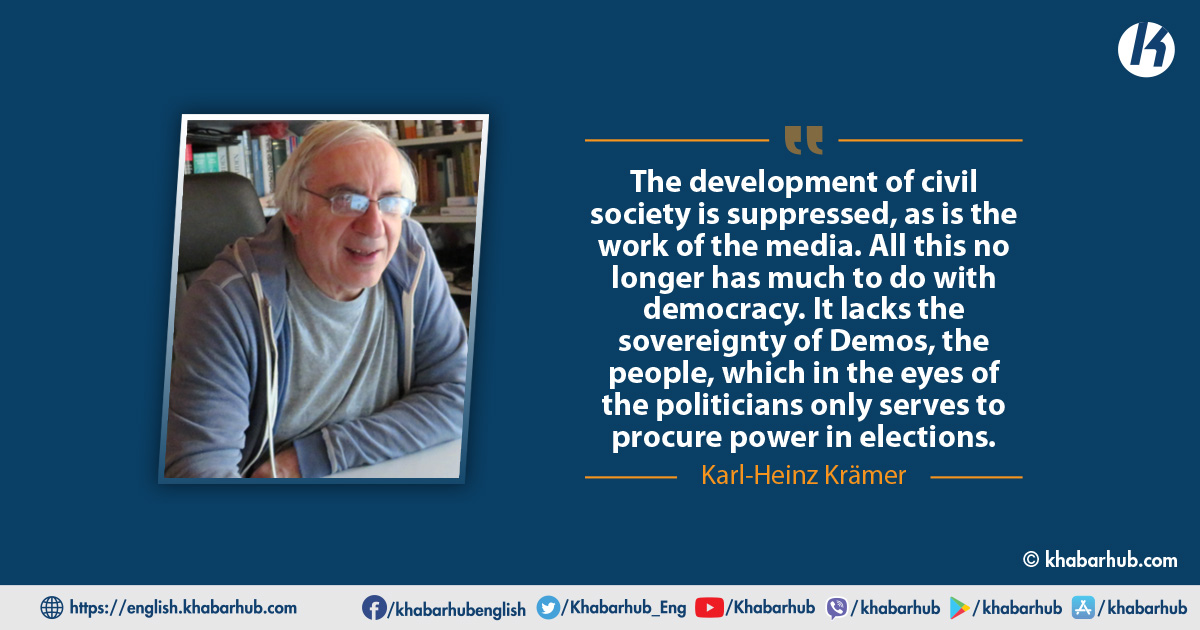Nepal has had to struggle for democracy for about seven decades. It was not until 2015 that a Constituent Assembly elected by the people was able to adopt a constitution that deserved to be called “democratic”.
Monarchy and Hindu state were abolished. Federalism, secularism, an independent judiciary and a multi-party parliamentary system were supposed to ensure political stability and proper social inclusion.
Constitution of 2015
Since then, sovereignty is supposed to be in the hands of the people, who elect their representatives to the national House of Representatives and the seven provincial assemblies every five years.
The indirectly elected representatives of the people from the provinces and the local level sit in the second chamber of parliament, the National Assembly. With elections at all three federal levels, this democratic system was activated in 2017.
Some three years later, it seems as if this hopeful system has also failed. In 2015, many observers had spoken euphorically of one of the best constitutions in the world.
Yet today’s constitution contains numerous deficiencies, some of them quite obvious, for example in the design of the federal system. In 2017, not even the names of the provinces, their respective capitals and the distribution of tasks and finances between the three system levels had been decided.
The fact was, however, that the second dissolution of parliament took place when the opposition had just agreed on an alternative prime minister and Oli would consequently have been voted out of office.
All this should have been clarified by the central level and the provincial parliaments as of 2018, but in part it has not been until today.
Moreover, in 2015, the Constituent Assembly failed to create a socially inclusive state. Although the Hindu state was abolished, patriarchy and Hindu political and social thinking remained.
This was also related to the fact that the ruling elite of the country remained the same. This elite showed after 2017 that it has no interest in changing this.
Power struggles of the political elite
The elite often disregards the constitution and subordinate laws when their regulations clash with their personal interests.
For example, Prime Minister KP Oli has not only delayed the final implementation of federalism, but he has even put many things back under the direct control of the central government, i.e. instead of federalism, he has once again strengthened centralism.
Oli has also repeatedly made clear his closeness to the Hindu rather than a secular basis of the state. On a similar line are demands by some leaders of the opposition Nepali Congress, such as its general secretary Shashanka Koirala, who has repeatedly advocated a return to the Hindu state.
The faults of the system are mainly to be seen in the political parties and their top leaders. The party structures with a few party leaders who regard their claim to leadership as a life task prevent younger politicians from growing up and integrating and introducing them to the tasks of the party and state leadership.
After its 2017 election victory, the Communist Party NCP has taken the politicization of all areas of public life, typical of Nepal, and the almost exclusive transfer of tasks and posts to loyal members of its own party even further.
The power struggle within the ruling party that began in 2020, and the split of the party into the original CPN-UML and CPN-MC parties ordered by the court verdict of 7 March, has highlighted the whole dilemma and the thinking behind it.
In his struggle to retain power, Prime Minister KP Oli seems to be willing to use any means and his political opponents respond in kind. Those who are not loyal to the respective political leader are removed from their posts, often to the point of expulsion from the party.
On the basis of the constitution and subordinate laws, this results in democratically elected MPs losing their parliamentary mandate overnight, which used as a popular means of changing the majority situation in their leaders’ own favor.
In 2020, the power struggles took place almost exclusively at the national level and the provinces appeared relatively stable.
This changed abruptly after the court ruling of 7 March on the legitimacy of the NCP. Since then, there is hardly a province where a single party has an absolute majority in the provincial assembly.
The country has virtually become a madhouse in which it is all about power struggles as if this is what people had hoped for with democracy.
Prime Minister Oli, who seems to be willing to use any means to maintain his power, stands out. Concrete regulations of the constitution and laws interest him just as little as judgments of the judiciary.
Oli is particularly fond of using those means that the classical writings once recommended to keep a king in power, some of which are anything but morally oriented.
While PK Dahal and his revived CPN-MC were the initial targets of Oli’s attacks, the latter soon extended to his opponents in the UML around MK Nepal and JN Khanal.
MPs from these two camps were lured with ministerial posts. When the CPN-MC withdrew the mandate of these defectors and they therefore constitutionally lost their posts, Oli unceremoniously reappointed them as ministers. It took a court decision to force Oli to respect the constitution.
There are also more and more accusations of bias against appointed judges. On the one hand, this is related to the party-political orientation of these judges when they were appointed, but on the other hand also to their involvement in previous rulings in connection with the political power struggles.
But even that is not certain with Oli. On 23 February, the Supreme Court had made it clear that Oli’s 20 December dissolution of parliament was unconstitutional and reinstated the House of Representatives. This did not prevent Oli from dissolving parliament again on 21 May.
True, he claimed that the reinstated parliament had not been able to elect an alternative government under Article 76 of the Constitution.
The fact was, however, that the second dissolution of parliament took place when the opposition had just agreed on an alternative prime minister and Oli would consequently have been voted out of office.
Since then, Oli has only headed an interim government under Article 77 (3), which may not be changed. But he did so on 4 June.
Oli’s machinations are only possible because he has a state president, Bidya Devi Bhandari, at his side who supports his every move without questioning. Yet Bhandari’s main task should be to uphold and observe the constitution.
Independent judiciary?
The judiciary is also becoming increasingly involved in the political power struggles, because there are hardly any decisions that are not immediately challenged before the Supreme Court.
The Supreme Court (SC) has so far refused to issue interim rulings even in cases of blatant constitutional violations.
One exception was the ordinance on citizenship law on 10 June. This was meant to implement a legislative initiative that had been lying dormant in parliament for years, as it was of little interest to the leading politicians.
Calls for a return to the Hindu state and occasionally even to Hindu monarchy are heard. The development of civil society is suppressed, as is the work of the media. All this no longer has much to do with democracy.
Oli now wanted to implement it only by ordinance in order to win the support of a part of the JSPN. The SC justified its interim order with possible legal complications. However, such complications would also have resulted from Oli’s various unconstitutional machinations.
There are also more and more accusations of bias against appointed judges. On the one hand, this is related to the party-political orientation of these judges when they were appointed, but on the other hand also to their involvement in previous rulings in connection with the political power struggles.
Conclusion
Oli has dissolved the national House of Representatives twice; there is also a crisis in the provincial assemblies. Oli himself does what he wants, and the judiciary is increasingly in danger of losing its independence.
The opposition, too, is primarily concerned with power. Besides, there is the pandemic, but the politicians, above all Oli, seem not to have noticed that at all. At least they only have time for it verbally on the sidelines. Meanwhile, achievements of the new constitution such as federalism and secularism are fading away.
Calls for a return to the Hindu state and occasionally even to Hindu monarchy are heard. The development of civil society is suppressed, as is the work of the media. All this no longer has much to do with democracy.
It lacks the sovereignty of Demos, the people, which in the eyes of the politicians only serves to procure power in elections.
(The views expressed in this article are the author’s own and do not necessarily reflect Khabarhub’s editorial stance)









Comment